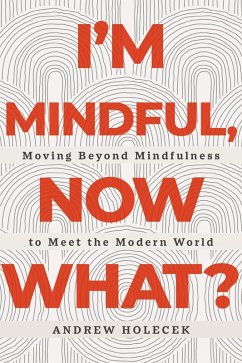
The Dark Side of Dharma (eBook, ePUB)
Meditation, Madness and Other Maladies on the Contemplative Path
Versandkostenfrei!
Sofort per Download lieferbar
16,95 €
inkl. MwSt.
Weitere Ausgaben:

PAYBACK Punkte
8 °P sammeln!
A dive into the less-known and undesirable side-effects of meditation and mindfulness.Researcher Anna Lutkajtis investigates why these negative ramifications of meditation and mindfulness, which are well-known in spiritual and religious traditions, have been ignored in contemporary secular contexts, such as Western psychology.Lutkajtis' research reveals that while meditation is commonly portrayed as a practice that is overwhelmingly positive, a growing number of research studies and anecdotal reports suggest that meditation can also have negative effects.Some meditators believe that these adve...
A dive into the less-known and undesirable side-effects of meditation and mindfulness.
Researcher Anna Lutkajtis investigates why these negative ramifications of meditation and mindfulness, which are well-known in spiritual and religious traditions, have been ignored in contemporary secular contexts, such as Western psychology.
Lutkajtis' research reveals that while meditation is commonly portrayed as a practice that is overwhelmingly positive, a growing number of research studies and anecdotal reports suggest that meditation can also have negative effects.
Some meditators believe that these adverse effects are a normal part of the contemplative path and a welcome sign of progress.
For others, such effects are completely unexpected and can be psychologically harmful.In religious traditions like Buddhism, difficulties associated with meditation are acknowledged and are usually viewed as milestones on the path to enlightenment or the result of an unbalanced practice.
In such traditional contexts, meditation teachers are equipped to deal with adverse effects if and when they arise. However, in the modern West, meditation adverse effects have been overlooked, under-researched, and generally misunderstood.
Given the current popularity of meditation, Lutkajtis argues that it is important to understand why meditation adverse effects have been ignored in contemporary secular settings.
Researcher Anna Lutkajtis investigates why these negative ramifications of meditation and mindfulness, which are well-known in spiritual and religious traditions, have been ignored in contemporary secular contexts, such as Western psychology.
Lutkajtis' research reveals that while meditation is commonly portrayed as a practice that is overwhelmingly positive, a growing number of research studies and anecdotal reports suggest that meditation can also have negative effects.
Some meditators believe that these adverse effects are a normal part of the contemplative path and a welcome sign of progress.
For others, such effects are completely unexpected and can be psychologically harmful.In religious traditions like Buddhism, difficulties associated with meditation are acknowledged and are usually viewed as milestones on the path to enlightenment or the result of an unbalanced practice.
In such traditional contexts, meditation teachers are equipped to deal with adverse effects if and when they arise. However, in the modern West, meditation adverse effects have been overlooked, under-researched, and generally misunderstood.
Given the current popularity of meditation, Lutkajtis argues that it is important to understand why meditation adverse effects have been ignored in contemporary secular settings.
Dieser Download kann aus rechtlichen Gründen nur mit Rechnungsadresse in A, D ausgeliefert werden.













